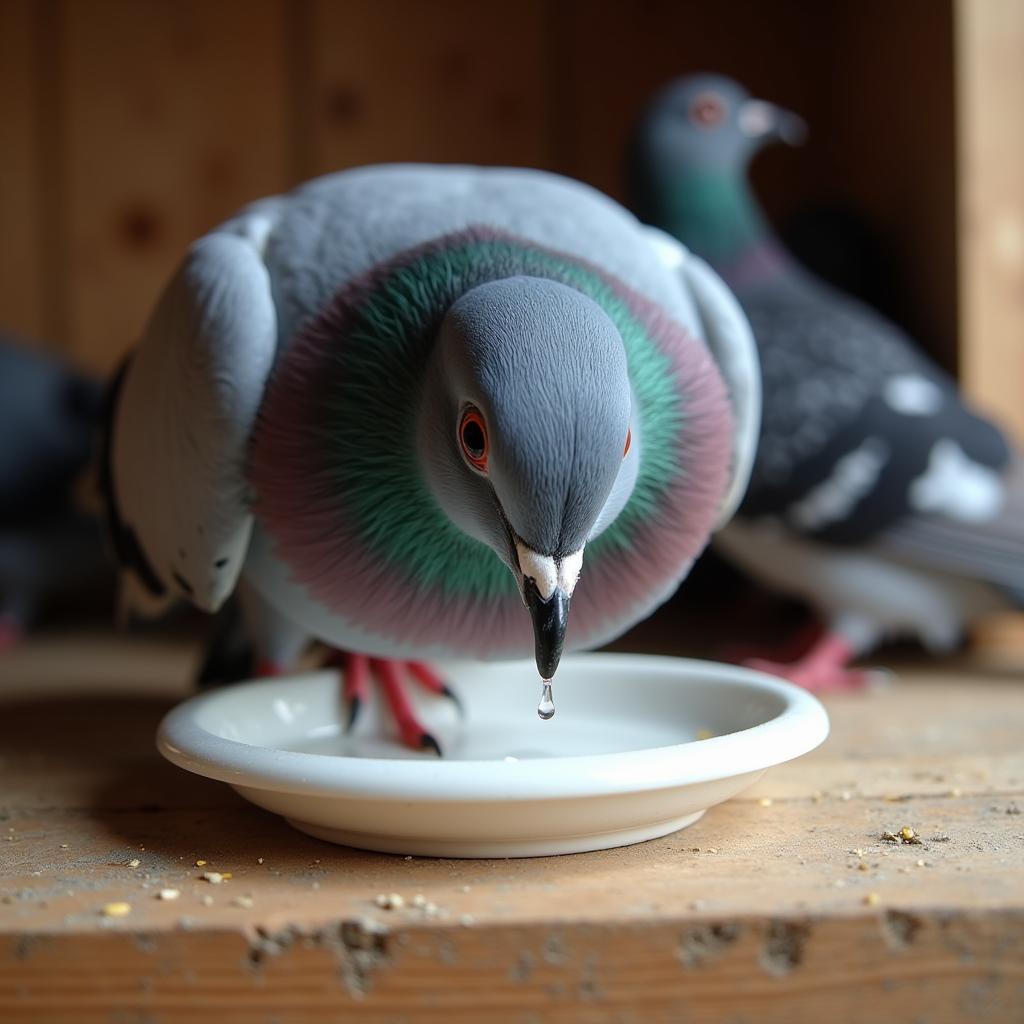Food For Racing Pigeons plays a crucial role in their performance. Just like any athlete, these feathered racers need the right nutrition to achieve peak condition and endurance for demanding races. Providing a well-balanced diet is essential for maintaining their health, strength, and ability to navigate long distances.
Choosing the right food for racing pigeons isn’t just about filling their crops; it’s a science that involves understanding their nutritional requirements at different stages of their lives and training. A poorly nourished pigeon won’t perform well, and might even suffer health issues. A well-nourished pigeon, on the other hand, will be strong, energetic, and ready to soar to victory. So, let’s delve into the intricacies of pigeon nutrition.
The Essential Nutrients for Racing Pigeons
Racing pigeons require a specific blend of carbohydrates, proteins, fats, vitamins, and minerals. Carbohydrates provide the energy for flight, while proteins are essential for muscle development and repair. Fats act as a long-term energy source, particularly important for long-distance races. Vitamins and minerals contribute to overall health and ensure proper bodily functions.
Carbohydrates: The Fuel for Flight
Carbohydrates are the primary energy source for racing pigeons. Grains like corn, wheat, and barley are excellent sources of carbohydrates. These grains should form the bulk of a pigeon’s diet, providing them with the fuel they need for demanding flights.
Proteins: Building Muscle and Strength
Proteins are the building blocks of muscle tissue. Racing pigeons require higher protein levels during breeding and molting seasons. Legumes, such as peas and beans, are good sources of protein, as are oilseeds like rapeseed and linseed. These ingredients help the pigeons develop and maintain strong muscles necessary for powerful flight.
Fats: Sustained Energy for Long Races
Fats provide a concentrated source of energy, crucial for endurance during long-distance races. Seeds like peanuts and sunflower seeds are rich in healthy fats. These fats help the pigeons sustain their energy levels throughout the race, preventing exhaustion and ensuring they can reach their destination.
Crafting the Perfect Pigeon Food Mix
Creating a balanced pigeon food mix involves combining various grains, legumes, and seeds in the correct proportions. A pigeon food mix can be customized to meet the specific needs of your racing pigeons, depending on their age, the season, and the intensity of their training.
Considerations for Different Life Stages
Young pigeons require a higher protein diet to support their growth and development. Breeding pigeons also need extra protein and calcium for egg production. During the molting season, a diet rich in protein and sulfur-containing amino acids is essential for healthy feather growth.
“A balanced diet is not a one-size-fits-all approach,” says renowned avian nutritionist Dr. Emily Carter. “Tailoring the food mix to the specific needs of your pigeons is crucial for maximizing their health and performance.”
Seasonal Adjustments to the Diet
During the racing season, the diet should be higher in carbohydrates to provide the energy required for competition. In the off-season, the protein content can be reduced, and more emphasis can be placed on maintaining overall health.
Common Mistakes to Avoid
Overfeeding is a common mistake that can lead to obesity and other health problems. Providing too many treats can also disrupt the balance of the diet. It’s essential to monitor your pigeons’ weight and adjust their food intake accordingly. Always ensure fresh, clean water is available, especially after exercise.
“One of the most common mistakes I see is pigeon owners not providing enough variety in their birds’ diet,” notes experienced pigeon racer, Mr. John Davis. “Variety is key to ensuring they receive all the necessary nutrients.”
 Hydrated Racing Pigeon Drinking Fresh Water
Hydrated Racing Pigeon Drinking Fresh Water
Conclusion
Food for racing pigeons is more than just sustenance; it’s an investment in their performance and well-being. By understanding their nutritional needs and providing a pigeon food mix that meets those needs, you’ll be giving your feathered athletes the best chance to succeed. A well-nourished pigeon is a happy and successful pigeon.
FAQ
- What is the best food for racing pigeons? A balanced mix of grains, legumes, and oilseeds.
- How much should I feed my racing pigeons? This depends on their age, activity level, and the season.
- What are the signs of a poorly nourished pigeon? Lethargy, weight loss, and poor feather quality.
- Can I give my pigeons treats? Yes, but in moderation.
- How important is water for racing pigeons? Essential, especially after exercise.
Need help? Contact us at Phone Number: 02437655121, Email: [email protected] Or visit us at: 3PGH+8R9, ĐT70A, thôn Trung, Bắc Từ Liêm, Hà Nội, Việt Nam. We have a 24/7 customer support team.